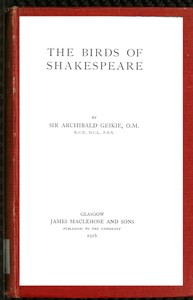The birds of Shakespeare by Archibald Geikie
"The Birds of Shakespeare" by Sir Archibald Geikie is a literary exploration written in the early 20th century. This work delves into the significant role that birds play within the poetry and plays of William Shakespeare, highlighting the poet's extensive references to various avian species and the deeper meanings behind them in connection with human nature. Geikie's aims are both literary and scholarly, as he endeavors to present Shakespeare not just as
a dramatist but also as a keen observer of the natural world. At the start of the book, the author reflects on the profound appreciation humanity has for birds throughout history, emphasizing how poets, particularly Shakespeare, have drawn inspiration from their behaviors and characteristics. Geikie notes that Shakespeare's references to birds extend beyond simple mentions; they serve as symbols that enrich his portrayal of the human experience. The opening portion establishes Geikie's intent to analyze Shakespeare's unique relationship with the avian world, showcasing how birds appear in various contexts across his works, thus inviting an exploration of the connections between literature, nature, and the complexities of human emotions. (This is an automatically generated summary.)
Read or download for free
| How to read | Url | Size | |||
|---|---|---|---|---|---|
| Read now! | https://www.gutenberg.org/ebooks/73281.html.images | 284 kB | |||
| EPUB3 (E-readers incl. Send-to-Kindle) | https://www.gutenberg.org/ebooks/73281.epub3.images | 3.7 MB | |||
| EPUB (older E-readers) | https://www.gutenberg.org/ebooks/73281.epub.images | 3.7 MB | |||
| EPUB (no images, older E-readers) | https://www.gutenberg.org/ebooks/73281.epub.noimages | 197 kB | |||
| Kindle | https://www.gutenberg.org/ebooks/73281.kf8.images | 3.8 MB | |||
| older Kindles | https://www.gutenberg.org/ebooks/73281.kindle.images | 3.8 MB | |||
| Plain Text UTF-8 | https://www.gutenberg.org/ebooks/73281.txt.utf-8 | 153 kB | |||
| Download HTML (zip) | https://www.gutenberg.org/cache/epub/73281/pg73281-h.zip | 4.4 MB | |||
| There may be more files related to this item. | |||||
Similar Books
About this eBook
| Author | Geikie, Archibald, 1835-1924 |
|---|---|
| LoC No. | 17013372 |
| Title | The birds of Shakespeare |
| Original Publication | Glasgow: James Maclehose and sons, 1916. |
| Credits | Carol Brown, Susan E. and the Online Distributed Proofreading Team at www.pgdp.net (This file was produced from images generously made available by The Internet Archive) |
| Reading Level | Reading ease score: 66.1 (8th & 9th grade). Neither easy nor difficult to read. |
| Language | English |
| LoC Class | PR: Language and Literatures: English literature |
| Subject | Shakespeare, William, 1564-1616 -- Knowledge -- Ornithology |
| Subject | Birds in literature |
| Category | Text |
| EBook-No. | 73281 |
| Release Date | Mar 29, 2024 |
| Copyright Status | Public domain in the USA. |
| Downloads | 254 downloads in the last 30 days. |
| Project Gutenberg eBooks are always free! | |

